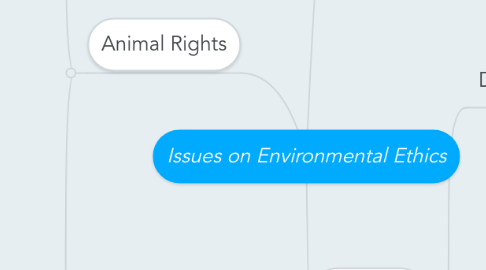
1. Animal Rights
1.1. Why some people believe animals deserve rights
1.1.1. Human animals have rights There is no morally relevant difference between human animals and adult mammals Therefore adult mammals must have rights too
1.1.2. They have similar levels of biological complexity They are conscious and aware that they exist They know what is happening to them They prefer some things and dislike others They make conscious choices They live in such a way as to give themselves the best quality of life They plan their lives to some extent The quality and length of their life matters to them
1.1.3. If a being is the subject-of-a-life then it can be said to have 'inherent value'
1.1.3.1. All beings with inherent value are equally valuable and entitled to the same rights. Their inherent value doesn't depend on how useful they are to the world, and it doesn't diminish if they are a burden to others. Thus adult mammals have rights in just the same way, for the same reasons, and to the same extent that human beings have rights.
1.1.4. C.S. Lewis said, "We may find it difficult to formulate a human right of tormenting beasts in terms which would not equally imply an angelic right of tormenting men." i.e. heavenly figures who are undoubtedly higher than us within the hierarchy do not abuse us, thus it is morally flawed to believe we have the right to abuse animals.
1.1.5. Even though some human beings (babies, senile people, people with some severe mental defects and people in a coma) don't have the capacity for free moral judgement, unlike animals, they are given rights. Pure speciesism
1.2. Why some people believe it unnecessary to give animals rights
1.2.1. Animals don't think Animals are not really conscious Animals were put on earth to serve human beings Animals don't have souls Animals don't behave morally Animals are not members of the 'moral community' Animals lack the capacity for free moral judgment
1.2.2. St Thomas Aquinas taught that animals acted purely on instinct while human beings engaged in rational thought. He also taught that the universe was constructed as a hierarchy in which beings at a lower level were there to serve those above them
1.2.3. Rene Descartes taught that animals were no more than complicated biological robots
1.2.4. St Augustine taught that "by a most just ordinance of the Creator, both their [animals'] life and their death are subject to our use."
1.2.5. Christian theologians used to teach that only beings with souls deserved ethical consideration. Animals did not have souls and therefore did not have any moral rights. However 'soul' is a complex hence useless term
1.2.6. Humans have rights because they live in a 'moral' community. Since animals don't have morals, they do not deserve rights
2. Pollution and Waste
2.1. Pollution is wrong - even the Bible agrees
2.1.1. 'So you shall not pollute the land in which you are; for blood pollutes the land and no expiation can be made for the land for the blood that is shed on it, except by the blood of him who shed it.
2.1.2. Son of man, when the house of Israel was living in their own land, they defiled it by their ways and their deeds; their way before Me was like the uncleanness of a woman in her impurity.
2.1.3. Therefore I poured out My wrath on them for the blood which they had shed on the land, because they had defiled it with their idols.
2.1.4. The earth is also polluted by its inhabitants, for they transgressed laws, violated statutes, broke the everlasting covenant
2.1.5. 'For the land has become defiled, therefore I have brought its punishment upon it, so the land has spewed out its inhabitants
2.1.6. I brought you into the fruitful land To eat its fruit and its good things But you came and defiled My land, And My inheritance you made an abomination.
3. The Earth
3.1. Dominion
3.1.1. You have given him dominion over the works of your hands; you have put all things under his feet
3.1.2. fill the earth and subdue it
3.1.3. The Earth has instrumental value - so long as it is useful to us, it is valuable. If this means we must care for it, we must
3.1.4. Utility
3.1.5. Consumption
3.2. Stewardship
3.2.1. The Earth is sacred so we should care for it
3.2.2. use it to serve one another
3.2.3. The Lord God took the man and put him in the garden of Eden to work it and keep it.
3.2.4. The Earth has intrinsic value - regardless of its utility, the Earth has value, thus we must care for it
3.2.5. Conservation
3.2.6. Preservation

